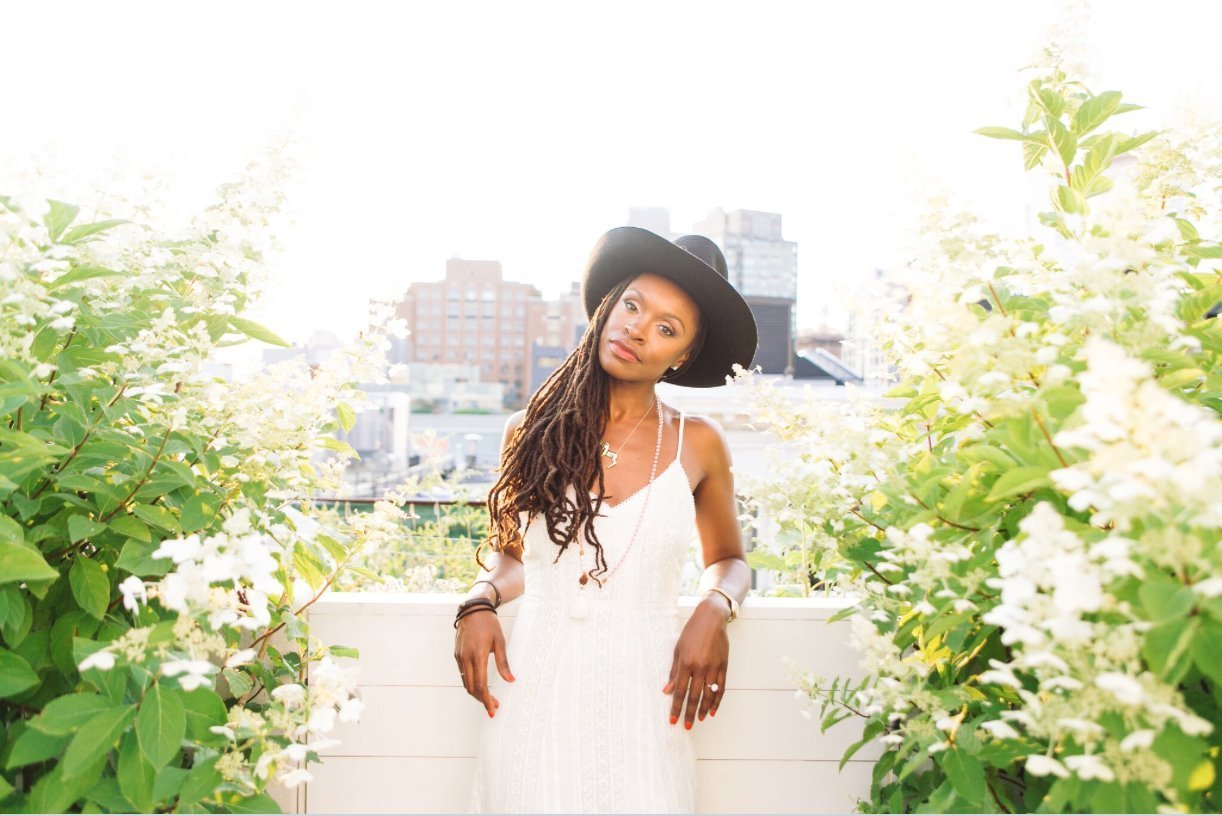
“It Shows Up In Many Ways”: Latham Thomas Shares Her Experiences With Racism In The Beauty And Wellness Industry
Mama Glow founder and doula Latham Thomas has been called so many superlatives, it’s hard to keep count. The New York Times described her as a “wellness guru.” Beauty and Well-Being referred to as a cross between “Superwoman and Mother Earth.” At Well+Good, where she’s a member of the wellness council, she’s been labeled a “healthy-living rockstar.” The deserved encomia rise from Thomas’s mission to do something that seems simple: make childbearing and childrearing as happy and healthy as possible. “When I was pregnant with my son [17] years ago, I was looking for resources in holistic maternal health and realized they didn’t exist in the way I saw fit,” she told BWB. “I instinctively knew that women need hand-holding when they are moving through a life-event like birth and wanted to provide that level of support for clients.” About three years ago, as an extension of her focus on holistic maternal health, Thomas created a capsule collection of self-care ritual topical products in collaboration with Good Medicine. Despite her substantial following, the products didn’t gain traction at retail. Beauty Independent talked to Thomas about the response to the collection, how racism and white privilege manifest in the wellness industry, actionable steps she thinks should be taken to push the industry forward, and her book, “Own Your Glow.”
What experiences have you had with racism in the wellness industry?
It shows up in many ways. What often happens in a space that is not designed for you to thrive in is that you are keenly aware of areas where you are not being serviced. When it’s been a space where only one type has had access, when you’re a minority, people aren’t seeing you as having unique needs. If you don’t have relationships or access to certain people—gatekeepers who set the rules—it’s really hard to succeed.
When we were doing the capsule, [retailers] said, “We will carry it,” and they didn’t. At a certain point, you look at all the factors involved. The same people we went to for information on buyers and were very cold would reach out and ask me to be part of a panel, asking for my time, but, when I needed theirs, I had to jump through hoops to get any kind of advantage or to even be considered.
When you’re used to it in every facet of life, you just kind of move on. It becomes too much to convince people. We decide to use the tools we can, that are affordable, that can acquire customers like social media and building a community. You do your own thing because trying to align and be in spaces where we believe we should be – we don’t get the support, exposure or reciprocity. When it comes to shelf space and getting into incubators and other fast tracks toward retail or a robust direction for business, the relationships and people who decide they want to believe in you aren’t there.
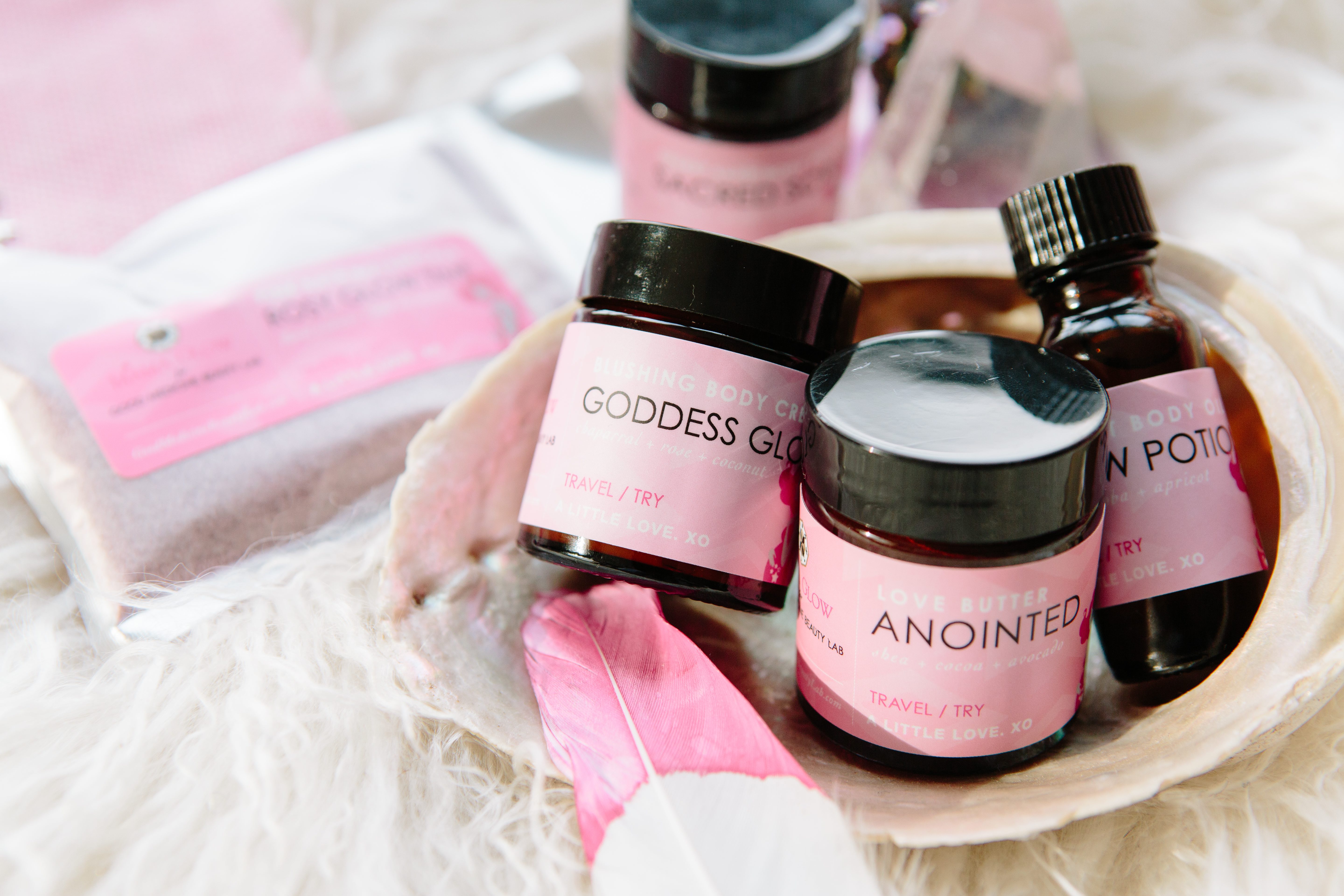
What’s happening with the capsule collection you did with Good Medicine? Are you going to continue it?
We are focused on doula services and education right now, and how to expand the education platform. We got a lot of support from Ashley Graham. She loved the beauty line and did a whole thing with Vogue [mentioning it], which is a prime example of advancing someone. The capsule was only meant to be a short period of time. Moving forward, we are thinking of possibly doing ingestibles, tinctures and tonics, more stuff to support the nervous system. We have so much going on we haven’t settled on it, but we are playing with formulas with another partner.
To be honest, the capsule was really challenging to get people to take us seriously. I reached out to so many [retailers], and we had an agency, but people had a hard time rallying behind this idea of a Black woman doing this. I was in all of the advertising. We went to everyone. There are probably three to four beauty hubs in a four- to five-block radius here in Brooklyn full of natural products, and none of them would carry it. People I’ve known for years, none of which were following up. When that is your experience, and you have these amazing reviews from customers, it discourages you from pursuing more. There’s really no excuse in the end other than it just couldn’t be me.
Can I say people were outwardly racist? No, but it’s embedded in our consciousness. It’s not a matter of being overtly racist, it’s how deep it’s bound in there and how much we have to unbind. We all have it. Everyone carries white supremacy. I’ve had that experience from everyone, from white people, other folks of color, it’s internalized racism. Again, it’s one of those things that makes people not want to even pursue the sales avenue. They’ll do DTC or influencer campaigns or beauty boxes because it’s easier than dealing with everyone telling you no. That was the challenge for me. It was clear people had what they like already and, if you aren’t in that mix, you’re out. That’s what I felt.
What advice would you give to retailers to be part of the solution?
Where there’s no chance you would pick [a product] up, whether it’s because of ingredients, packaging, etc., then say that. Advise someone. Tell them what to explore. Put them in touch with someone who might be a fit or can better get them ready. Don’t just not respond.
A bunch of retailers who told me no or I didn’t hear back have reached out now that I did the touchpoint with Gwyneth Paltrow. Where were those interactions [before]? Were you kind? Could you have helped more? I would like to see more grace and supporting people, helping people succeed, not just when it’s convenient, even if the answer is no. Everyone deserves decency, and people think they’re better in some way, so they don’t offer it. They don’t believe you’re worthy of it. We have to get out of that headspace.
There’s really so much to learn from creators of color that are tied to solutions, their lineage and how to make it possible to reach more people. Wouldn’t a retailer want that? If there is a product in your shop that addresses needs for people who can’t find [products for them], you have customers for life. What I know about Black women is that they are loyal, they tell everyone. Women do this in general, but think about that purchaser and that person’s life cycle. If they find someone that sees their humanity and their needs, you’ve got a customer for a very long time.
What are your thoughts on wellness in relation to white privilege?
We see it all of the time, a product or ingredient will come from an Indigenous community or part of the world, and it has no real anchor or tether to that place. The history around it is erased. It’s extremely important not to extrapolate a thing from its essence or exoticize it. If you are going to remix it, you have to remember there was a master before you did so.
If you are pulling ingredients from Ghana—or anywhere in the world—what is your initiative there? Who are you employing? How is your supply chain? Is it sustainable, fair trade, what are your ethics? How do you give back to that community? And not, “We give a small percentage back or a pair of shoes.” It has to be a deeply integrated, empowering offering. Most importantly, we need to include the story of the people where we are getting these ingredients from. A lot of cultures get caught in the mix and aren’t honored or seen for the beauty of what they offer. I would like to see less appropriation and more appreciation. You can appreciate something instead of making it your own.
It’s also really important to understand that anyone with privilege can always leverage opportunities to those who are underestimated. If the door’s open, hold it open, don’t just let it close behind you. If you’re in the room, you can say, “Either you create an access point for these brands or I’m out the door.” You can throw your weight around, if you have it. If you’re in the room, how do you help others get there, too? And if you can’t, maybe you need to leave the room to signal change. It’s really not about bringing the whole thing down, it’s about the pursuit being more equitable.
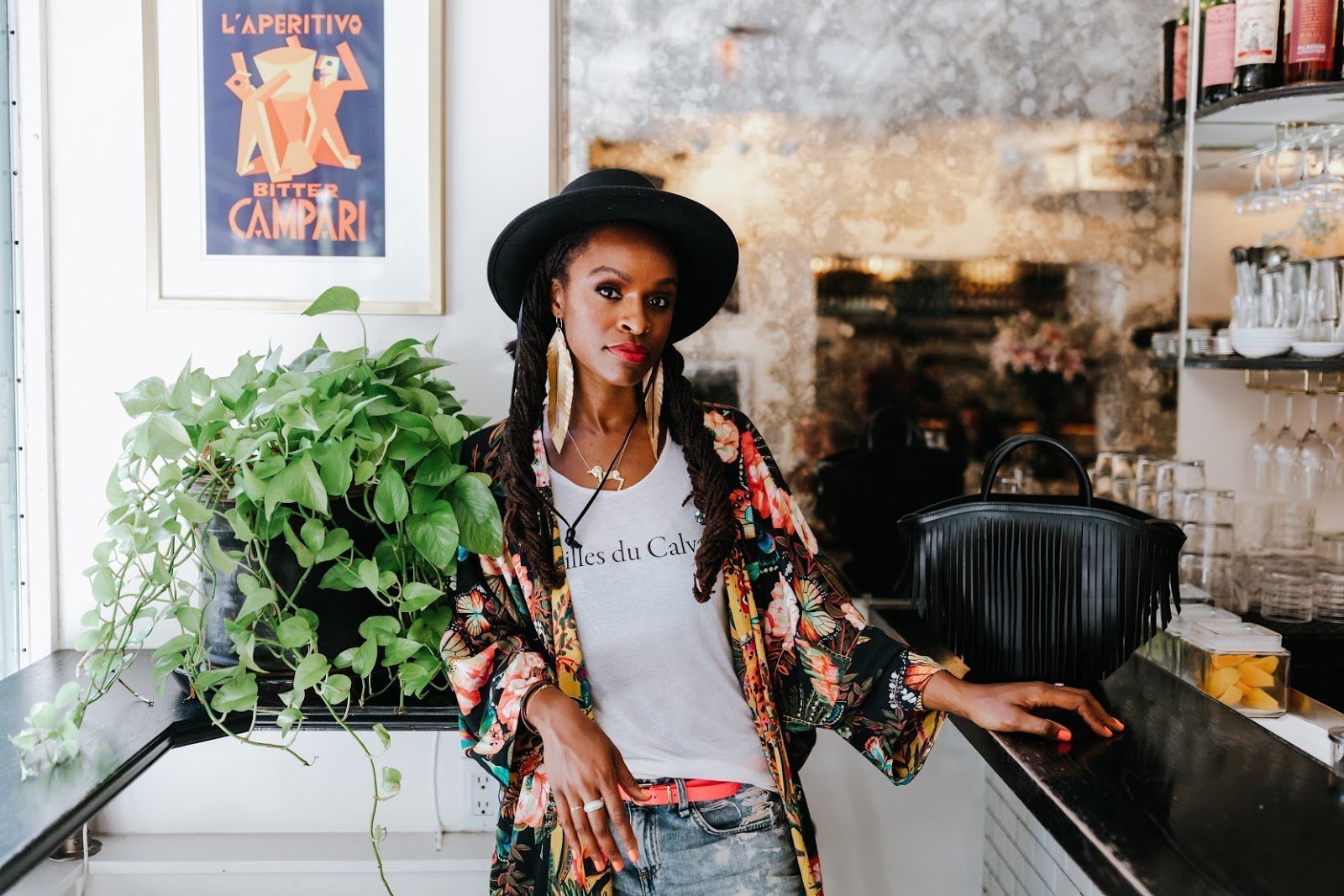
What are other subtle ways wellness shuts out Black people?
Most of the products marketed towards Black people are full of horrifying ingredients. They’re toxic. These things should not be on or in our bodies. Relaxers haven’t evolved in ages. They’re super painful and bad for the scalp. We have to figure out a better way to not only innovate, but provide better ingredients in the mainstream for Black women. Brands have to formulate healthier. Our people deserve to not get cancer with whatever they’re using. It’s all of our responsibility to commit to creating more safety in products for people of color.
And, then, we have to rid this idea that you don’t have to market or create products for various shades or inclusivity in hair type and texture. People of color miss out on amazing products that simply aren’t effectively marketed if they do even exist. The amount of money spent in this industry from persons of color tops pretty much everyone else, for things not even designed for us. Imagine if products were made for us in mind.
What are some actionable steps the industry can take toward progress?
I love the 15% pledge that Aurora James spearheaded for retailers to commit shelf space to Black creators and, not only “allow” shelf space, but [provide] an ease of being in the space with their counterparts where they can compete with their products.
Second, incubators are a wonderful place where you can create a path for people who have products, but maybe don’t have the business acumen, where they can go through the program and gain the tools necessary to succeed and launch their products and services in a way that is equitable. It’s also great for businesses to assess and understand the unique needs and blinds spots the industry has. [The industry should be] possibly creating advisory boards of those who are at different points of the supply chain and development. Invest. There needs to be equity for those of BIPOC backgrounds. Brands that are in the making don’t need a ton of money, it’s just removing the barriers of access.
Visibility. Seek advice and expertise from Black people in this space. Have them on panels, include them in your engagements. Do you realize that, if you are a beauty director and you are Black, you have to know all the products, even the ones you don’t use or that don’t work for you. A white beauty director doesn’t have to know about what Black and brown people use, that’s how it is. We have to do better placement, more media, more platforms. And it’s not just about one diverse voice, where that person is tokenized. Don’t have them there for a specific purpose only, bring them out in the bigger dialogue, make them integrated and truly work together.
Brands, share your designers, your line sheets, what you’ve learned. Bring the barriers down for entry so people can have a chance. Do more takeovers from other brands, influencers and persons of color in the industry. Share the mic. Consumers, go follow 10 more POC brands and influencers. Do more tagging on Instagram, make a purchase from a BIPOC brand once a month, subscribe to POC beauty boxes and newsletters. Spread the love right now. Put your money behind people. We can all do that starting today.
There are people doing a great job trying to elevate and level the playing field. Everyone has a voice. It shouldn’t be for this next month, then phase out the visibility. No, it has to be now and a long-term approach.
Are you optimistic changes will happen?
System-wise, change is slow. It’s not like tomorrow everyone’s going to be skipping and singing Kumbaya. Every day, we must show up to the office of change. Whoever is reading this, whoever is making decisions, they have to be the ones. The system only operates because of people. Therefore, if people break with the system—it will take time to trickle down—but the immediate interactions, they’re felt right away. It’s two-fold. It takes time [and] a big effort to make beauty inclusive, but you have to put your money where your mouth is on a daily basis. Beauty has always changed and evolved, this is just the next iteration. It needs to not be an initiative in the moment, but the way of the future.
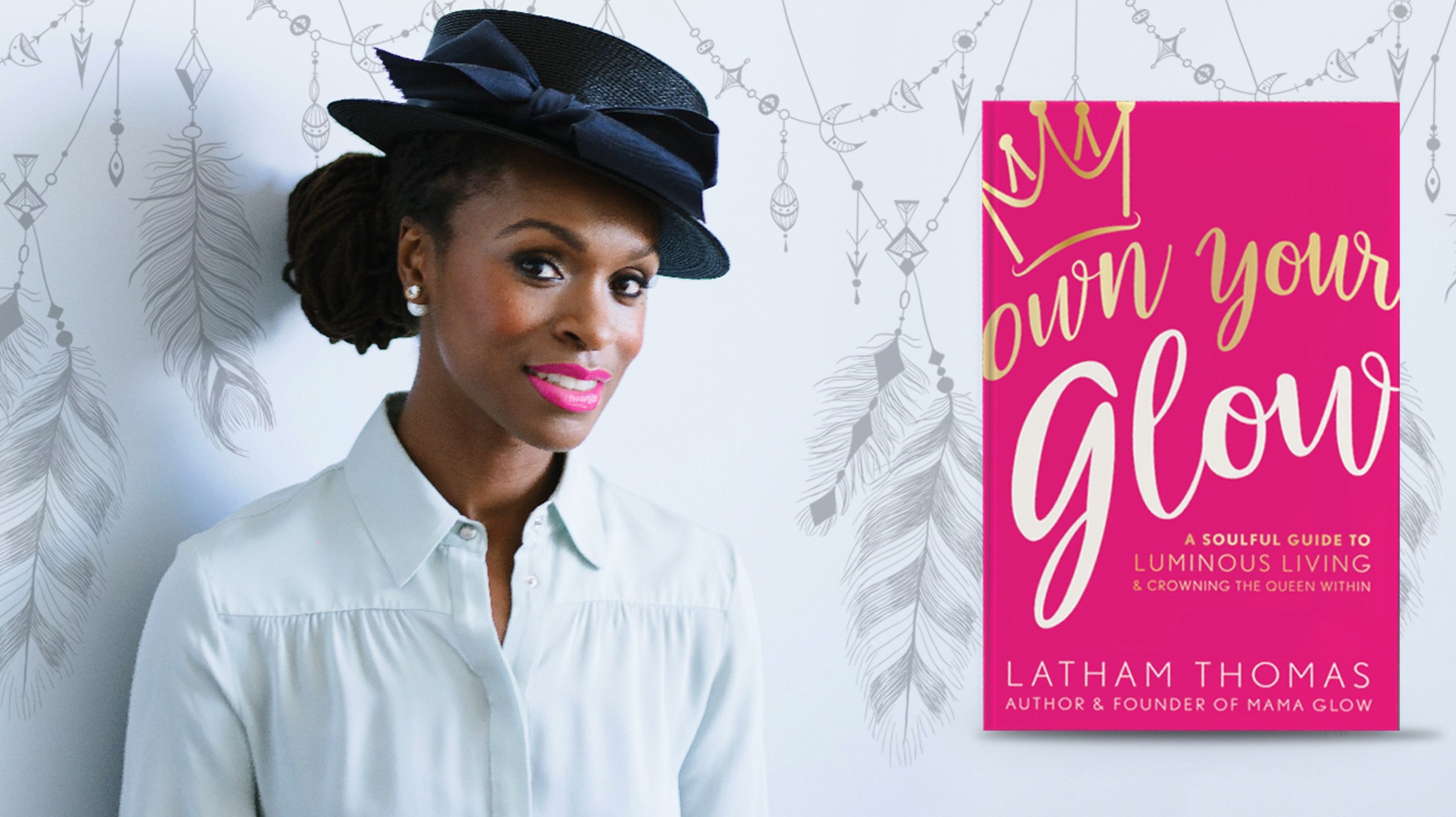
You just rereleased your book, “Own Your Glow,” in a journal format. What are key takeaways from it that are relevant to the global conversation?
What I truly hope people can take away from this moment is intention in their choices, the way they are addressing this moment. Look around, slow down. How have they contributed to any of this in the past and how can they contribute to positive change going forward. It’s about reflection, to reassess how we show up in the world. [The book] is not about racism. It’s about really truthfully examining who we are and who we are becoming. If we want to effect change, we have to see ourselves as change makers along with our capacity to be great and how that ripples throughout the world.
I really believe that individuals are going to make these changes possible if they’re doing the work I’m asking them to. To connect to that energy [and] create space for healing, they have to find that for themselves, a pathway to self-care. Right now, we are fraught. We’ve been cooped up and, now, there’s the political unrest and violence we’re witnessing. That’s the invitation, an opportunity to wrap themselves up, look after themselves more tenderly and challenge themselves to do the hard work.
Feature photo credit: Syed Aqeen
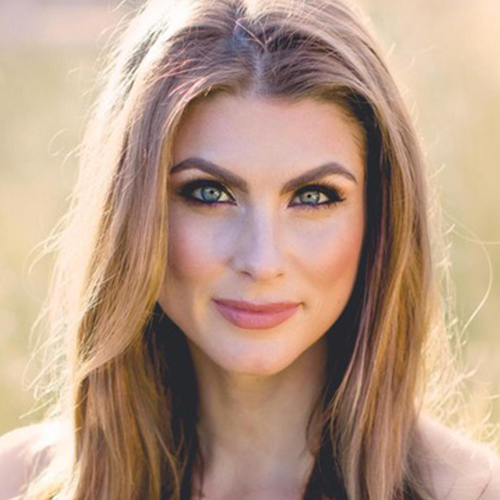




Leave a Reply
You must be logged in to post a comment.